Explorer Ventures Liveaboard Diving Fleet has been well-known among divers for many years now. They started operating 33 years ago with a single boat. Since then, the fleet has grown, and they have assembled a wide range of liveaboards in truly unique destinations. We were interested to know how they started building the fleet and what makes Explorer Ventures so special and popular with many customers. Clay McCardell (President and Owner of the fleet) and Rachel Huber (Web Marketing and Operations) were very kind to share their story with us.
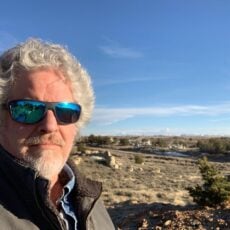

Yevgen (CEO @Divebooker.com): Hello, first of all, thank you for the interview, it was very kind of you to speak with us. I read on your website that you have been diving since childhood. You were 12 or 13 when you started diving, right?
Clay: Well, I did my first dive in Cozumel when I was about 12, this would have been in 1975, I guess. Today it probably would be called a discovery diving course. But back then it was a little bit of pool work. We dove to 150 feet falling along the continental shelf in Cozumel. I don’t remember too much about it, except I remember, my sister was with me and she went in the wrong direction. We spent the entire time trying to track her down and get her turned around. And then the dive was over. So other than that, I don’t think we saw much. It wasn’t very exciting, other than the fact that of course, you’re underwater and breathing. Which for the first time doing that is always pretty cool.
Yevgen: And what was the most exciting memory from your first diving experience?
Clay: You know, I’ve always personally enjoyed the sense of flying. I’m a pilot, and underwater you get the same sort of feeling. You’re moving in three dimensions, and it’s just a neat feeling. The ocean world is a completely different world.
Yevgen: How did you start Explorer Ventures?
Clay: I was in college in 1982 and dove a few times. When I got out of college, we had a small real estate company. My family did. We ended up buying a liveaboard dive boat that was in the Cayman Islands and leasing it to a vessel manager. It turned out to not be the best and business decision. So, we ended up repossessing the boat about six months later, in 1987. That was my introduction to the liveaboard diving business. It was a very, very steep learning curve. I didn’t know anything about big boats. I didn’t know anything about the diving industry. I knew a little bit about diving, but I wasn’t a divemaster or instructor. But, ever since then we’ve been going strong. The original boat was operating out of St. Maarten, and we’ve been operating there ever since. 34 years and counting now.
Yevgen: So, you had absolutely no experience when you started managing a liveaboard company? And how did you start to build a fleet?
Clay: We were operating one liveaboard for approximately 10 years or so. And we had partnerships with some other boats. Then, in 1998, we bought a vessel in Australia, and we had that for about 10 years. Then over the next six or seven years, we bought two additional boats. Both were based in the Caribbean. We started to shuffle the boats around. One was in the Bahamas for a time, the other was in the Turks and Caicos. Then we moved into looking for suitable partners around the world that would be interested in the expertise that we developed over the course of the previous 20-30 years.
From our perspective, we have some partner vessels that do an amazing job, and I think one of the reasons that they enjoy working with us is that we’re first and foremost boat operators. That’s where we started. We know the challenges of owning and operating a boat, the fiscal challenges, the client challenges, the sales challenges, the marketing challenges–all of that. Trying to make sure that everything goes as smoothly as possible every week.
Yevgen: Since you mentioned that you have some partner vessels, how do you maintain the quality of services on those boats?
Clay: The boats were known for their quality already. We have partners that have been in the diving business for many, many years, and they have a great ongoing reputation. That gives us a little bit of an advantage, we don’t have to start from ground zero. It’s advantageous to all of us to have a standard of care and standard of package inclusions, to keep everything primarily gauged for the American market and for the international market, as well.
Yevgen: What are your personal responsibilities in the company now besides being a president?
Clay: (Laughing) I can’t say that it’s anything that’s unusual. Certainly, overall management of the company and oversight of all the staff. I have the great advantage of having some amazing people working for us that have been with us for many years: 15-25 years. Rachel started with us… when did you start with us?
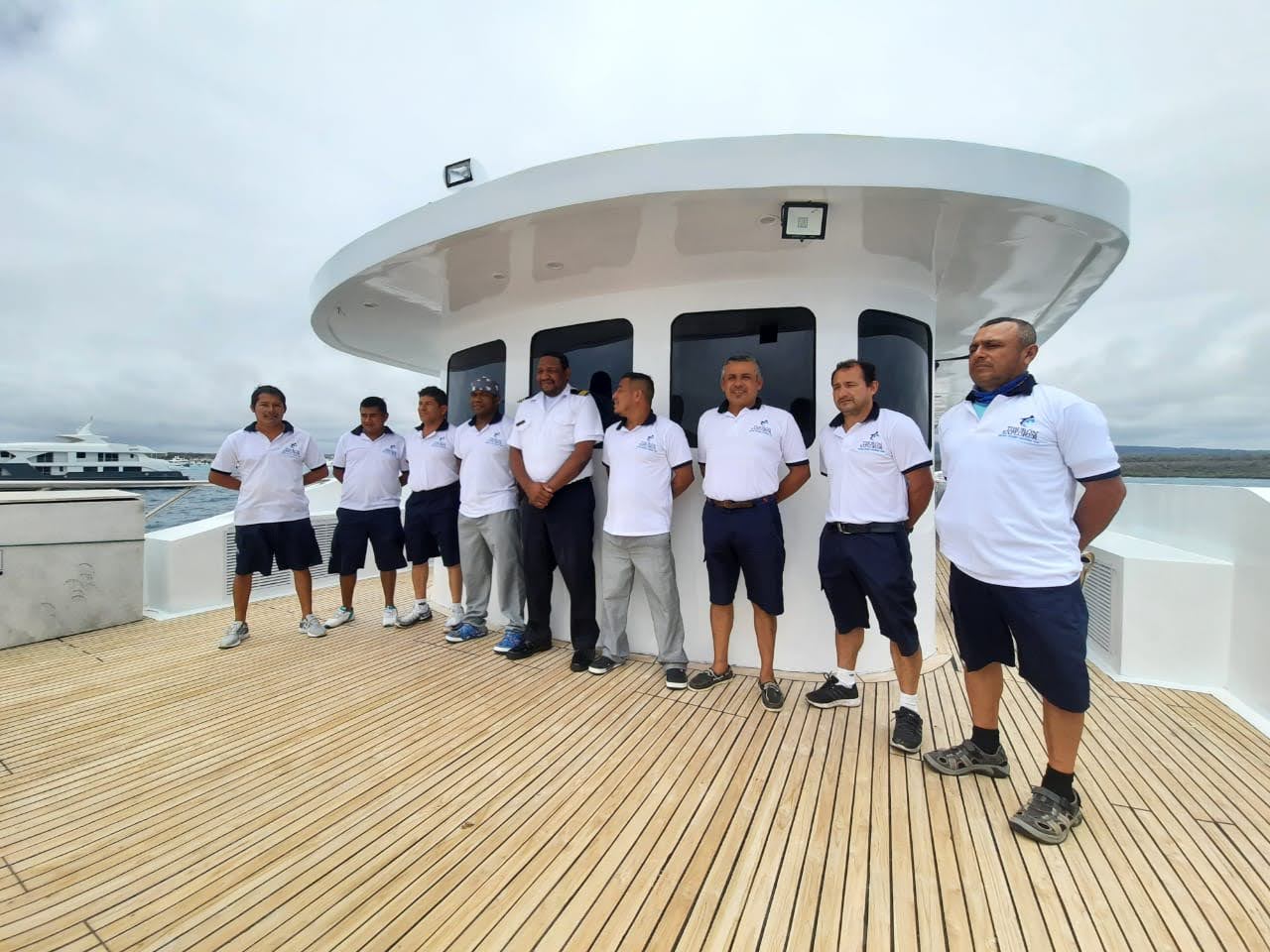
Tiburon Explorer crew team
Rachel: Around 2008.
Yevgen: And how did you start diving, Rachel? When was your first dive? Did you start diving before Explorer Ventures, or after joining the company?
Rachel: I started diving before Explorer Ventures. I’m a dive instructor. I started diving when I was 15. I’m dating myself here (laughing). 20 years ago, I was young when I started. I grew up in the prairies, so it was just a whole new world for me. Then I got my instructor’s certification in 2007. My first job in the industry was on the Caribbean Explorer I in the Bahamas, with Clay. I was there for a couple of years and then I transferred to the Caribbean Explorer II in Saba and St Kitts. I was there for many years as well. I also have a degree in tourism development and marketing. So, I ended up putting those together and working land-based with Explorer Ventures. Now, I wear many, many hats. You know my email line is marketing and operations, but I do quite a few things at EV. Social media, media, and a lot of marketing. I also spearhead the green and sustainable operations for Explorer Ventures as well. So, lots of hats, but I’ve been with the company for a very long time. I also have the benefit of knowing how the vessels work inside and out as a crew member, and the administration side.
Yevgen: Saba and St. Kitts, as far as I see you both are very excited about this destination, so what makes this destination so special in your opinion?
Clay: Saba is just a magical place – the first self-sufficient marine park in the world. It was created in June 1987, the same month that we started operating there. It’s not that famous, I think because there’s not a lot of big stuff. You do see sharks and the occasional whale shark; and occasional mantas. There are probably 10 to 15 dive sites that we do there on a regular basis. But it’s just a magical place. If you talk to people like Rachel who have been diving on various boats in the fleet, who have been to the Galápagos and various other places if they wanted to spend a long time working on a liveaboard, the Saba-St. Kitts itinerary would probably be where they want to go. It never gets boring. Diving is just quite different on every island.
Yevgen: Has diving on Saba and St. Kitts changed since the 80s and 90s when you started?
Rachel: One of the benefits of Saba versus other Caribbean islands is that specifically Saba doesn’t have any beaches. One of the main things that happen on a lot of the smaller Caribbean islands is that the sand washes off and the storms stir up everything. I find that some of the dive sites like Diamond Rock specifically, or some of the deeper sites, because of where they are and how the current goes around the island, it doesn’t have the same effect as it would in some other like Caribbean destinations. They stay vibrant. There haven’t been such dramatic changes as there have been other places.
As for St. Kitts, I don’t think it’s changed too much. On St. Kitts, there is actually an interesting site that gets better with time, a wreck outside St. Kitts called the River Taw. It’s an old freighter that sank and broke in two. And in the past, I’ve dived there quite a bit. It’s been growing because everything grows on the wreck, it’s been getting more vibrant and more colorful. And then there are storms that happen here and there, and you see little shifts in the wreck. That’s been something that I really look forward to going to. And that’s one of the favorite guest spots. Over time, it’s been great to see what has been attracted to that wreck. Saba is deeper, more offshore, whereas St. Kitts has more wrecks and reefs. There is a lot of variety.
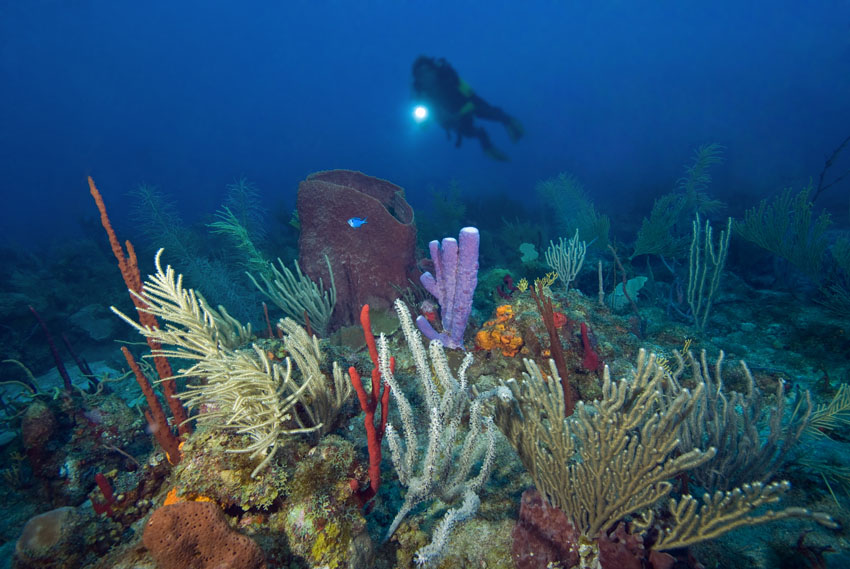
Diving on Saba
Clay: Saba and St. Kitts are not high tourism destinations. Well, there are a couple of other small dive operators in St. Kitts and we generally don’t share dive sites. So, there’s very little traffic on the reefs. Because Saba is such a small island, only 5 square miles (12 kilometers), it is quite easy for the police. If anybody comes into Saba, somebody living on the hill can see them coming 20 miles (50 kilometers) away. There is not the typical conflict between anglers and divers that there are other destinations. And the other thing, Saba has more deep sites at about 50-60 feet (15-18 meters) that are less affected by changing temperatures and all that. So, I haven’t noticed a hugely notable change.
Yevgen: Do Saba and St. Kitts have to do a lot in terms of reef conservation, or is the situation quite good?
Clay: Yeah, the diving there is very tightly controlled. Yacht passengers cannot come and dive by themselves, they have to use a local dive operator. We are the only liveaboard that operates there. There are one or two other local dive operators that do an excellent job protecting the area. We serve a lot of famous destinations, but I would say that I hear far more often from people that have gone back to the Caribbean Explorer 5, 6, or 15 times.
Rachel: Yeah, there’s something just charming about it and it’s hard to explain until you’ve actually been there. Even the visuals of what you’re seeing in Saba are cool, like all the roofs are the same color and all the houses are the same color. King Kong was filmed there. I think it’s one of our destinations with the highest number of repeat guests.
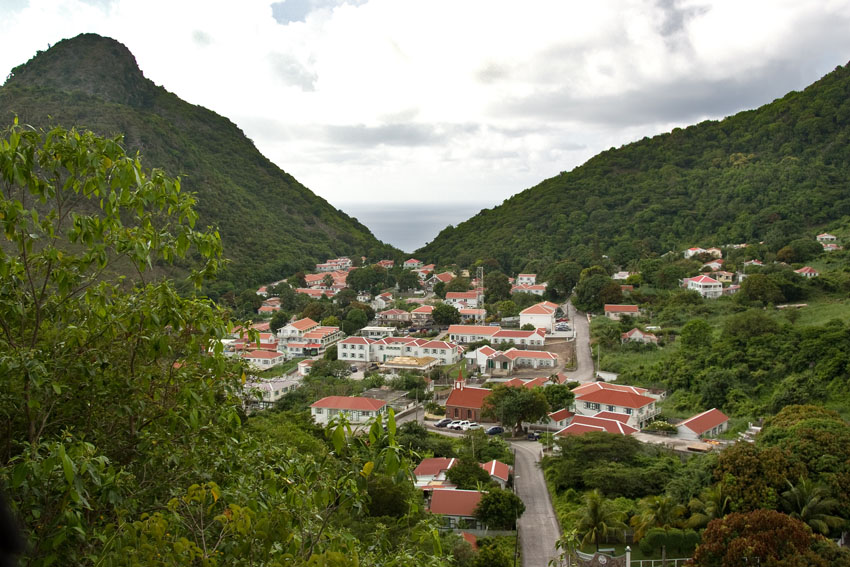
Saba – Caribbean island, a special municipality of the Netherlands
Yevgen: Caribbean Explorer II was the first and remains the only liveaboard that has joined Green Fins (Green Fins is an initiative that protects and conserves coral reefs through environmental guidelines that promote sustainable diving and snorkeling industries). They mostly work with diving centers. What is your vision with regard to marine conservation?
Rachel: 1987 was when we first thought about sustainability on the Caribbean Explorer. We have a strong timeline of conservation initiatives. Being a liveaboard, we go to the same sites every week. We want to make sure that the destinations where we dive stay healthy and stay vibrant, that’s our livelihood. Everything that has been developed has been developed with the environment in mind. We pair up with Green Fins because we’re looking for ways to improve further. We have been helping them to understand the liveaboard industry and understand how vessels operate and why they’re different from land-based dive operators. It was as much learning for them as it was for us. How can we tighten up our operations, and how can they help get the message out with policies and with education? The Caribbean Explorer II was the pioneering vessel to try to get liveaboard policy moving. We’re still working with them on the next steps of how to expand that. It’s just COVID that put us a little behind on our timeline. But our goal is to continue what we’re doing, to continue to improve.
We want to make sure that the destinations where we dive stay healthy and stay vibrant, that’s our livelihood
Clay: We were honored to teach them a little bit about the challenges that the larger boats face and what kind of procedures are necessary. We’re dealing with far more experienced divers on average. It’s not a discovery diver student that’s new and needs education. You really have to try to find a line between protecting the resources that we depend on in the dive sites and protecting the ocean environment. But make sure that the experienced divers can do their own thing to the greatest degree possible and enjoy the dives in ways that they want.
Rachel: Part of that is to empower divers to take this message with them, to wherever they’re diving. We have “Know Before You Go” sustainability information sent before the trip. They can read this guide, learn from it, and take the knowledge elsewhere with them when they dive. Ocean conservation is needed globally.
Yevgen: I wanted to ask you about your guests. Can you tell us more about divers who choose Explorer Ventures liveaboards?
Clay: I think that our average client is far more experienced than the average client that a land-based operator gets. We are a combination of hotel, restaurant, and dive operation for the course of the week. And it is incumbent upon us to make sure that we don’t miss any of those three things and have the best customer service possible. So, our average client is probably a little bit older, a little bit more experienced, certainly concerned about the environment. They spent a lot of money to buy their gear, get trained, do additional training, and travel internationally. They are concerned with what they see, they’re concerned with changes in the reefs. And by and large, they are interested in learning as much as we can teach them about how to preserve the environment. We learn a lot from our clients as well. They bring practices from other parts of the world that we might not have already been aware of. So it’s a constant learning experience for all of us.
Yevgen: How do you work with guest reviews? What makes it so important for you to gather reviews about your services?
Clay: We started doing customer reviews in 1987. And back then it was just by mail. People would come off the boat, we would send them a letter with a questionnaire for them to fill out and mail back to us. I’ve always felt that it’s particularly important. Every boat has a guest book, and that is certainly a good source of information too. But I’ve never felt that represents a true feeling of how the trip went. Because once people get off the boat or on the flight home, they get back to their normal life, they can reflect more honestly with themselves, on how the trip was, was there something that could have been better? So there is always a separate channel that’s not dependent on just the last dive. People can say, this is how we felt about the trip, this is how the island tours went, this is how the food was, this is how the dive staff treated us. We read them all and contact them if necessary. But mostly they’re positive reviews, and we’re able to know what we’re doing well, and what we need to work on in order to make the experience the best for everybody.
Rachel: Online reviews and feedback forms are very important to us. But I think especially in the last couple of years has become even more important for our guests to see and hear about the experience from a third party.
Yevgen: I once heard you said to a customer “Welcome to the EV family!” What does it mean to be a part of the family?
Rachel: One of our oldest sayings, mottos of Explorer Ventures is “You come as a guest, and you leave as family or a friend.” I think that’s absolutely true. From the office staff to the crew, everybody is very down to earth, everybody is deeply passionate about what we do. We put the customer experience really at the top tier. For instance, I have people on my Facebook as friends that I dove with 10 years ago on the Caribbean Explorer I. A lot of people return, and we have a high repeat rate. So, we are a family, we want our guests to feel like family.
Yevgen: I heard many amazing reviews about the Tiburon Explorer, your newest liveaboard in the Galápagos. What does it take to build a new boat from scratch?
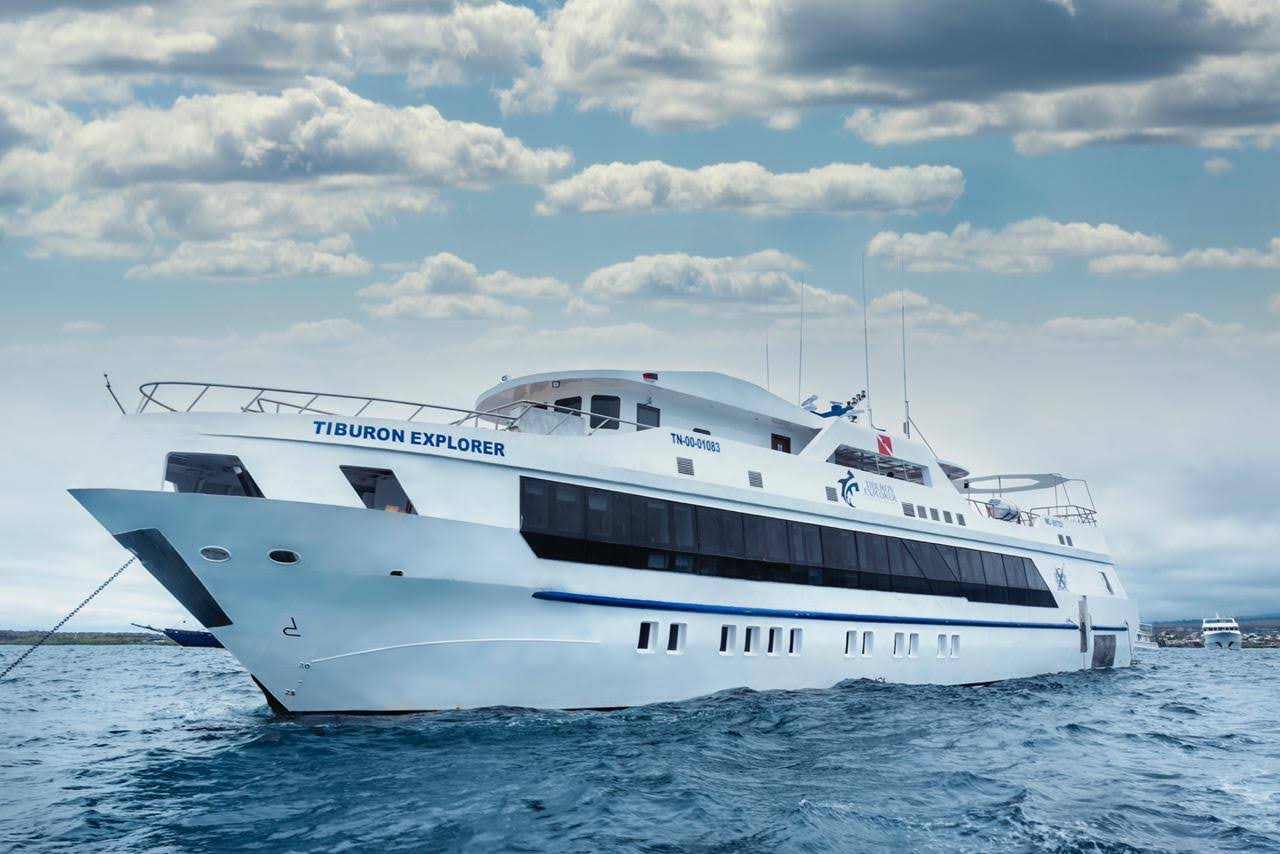
Tiburon Explorer (Gapalagos Islands) – contemporary liveaboard, debuted in September 2020
Clay: It’s difficult to do. Our partners in the Galápagos have close to a 30-year history in building and operating tour boats and dive boats in the Galápagos. And it is a difficult place to operate. The logistical challenges make it an expensive place to operate and an expensive place to travel to. We talked to our partners and designed the absolute best boat that we could think of.
Yevgen: You operate very different boats. Can you say what makes each of your boats different?
Rachel: Starting with Emperor Explorer in the Maldives. One of the main things that we hear back from customers that distinguish that vessel is the dive guides and the sites. You can choose what you’d like to see, and what is on your bucket list. The vessel, it is very stable, very spacious, and very modern. In my opinion I feel like the Tiburon and the Emperor are very much aligned. A lot of the reviews we get from both are about the excellent crew.
Our sales staff concentrates on making sure that we’re matching people with the expectations that they have about their dive trip
Clay: The Grand Sea Explorer certainly is one of the premier boats in the Red Sea. And we’ve got a package designed primarily for our American clients. It’s an exotic destination for people from North America. Indonesia is a different destination in itself. It has a lot of old-style boats that are very romantic and traditional. White Manta Diving, our partner in Indonesia, concentrates on building larger, very safe steel-hulled ocean-going vessels.
One of the things that fascinates me in this business is that all of the destinations and even itineraries within the destinations that we run are very different. Our sales staff concentrates on making sure that we’re matching people with the expectations that they have about their dive trip. Under normal circumstances, the Caribbean Explorer II goes to 2 or 3 different islands during the week. If people don’t want to spend time on the boat, they can go horseback riding on the beach, they can go zip lining, or they can do historical tours like Brimstone Hill Fortress on St. Kitts. The Turks and Caicos have absolutely beautiful sandy beaches. It’s mostly wall diving, and it’s more about sharks. And then you go to a place like the Galápagos that has colder water, and it’s certainly more high-voltage diving to dive at the Darwin and Wolf Islands, to see the hammerheads. We’ve got everything from relatively budget offerings that are lower cost to very high-end luxury, and we find that that’s a particularly good mix for us.
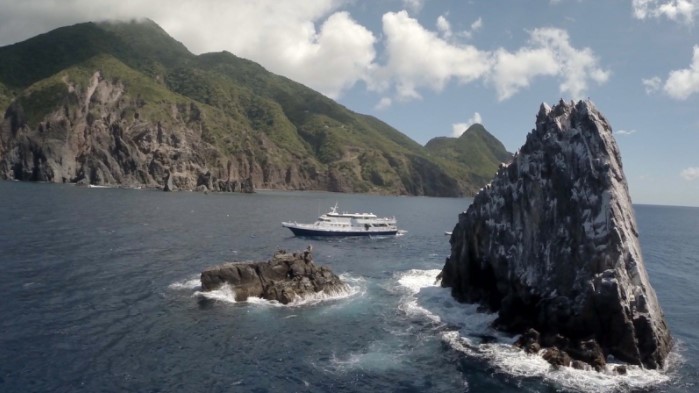
Yevgen: Do the liveaboards you offer have anything in common?
Clay: The only common thing really is a baseline of customer accommodation, whether it’s private bathrooms in the cabins or service on board, that type of thing. The staff-to-guest ratio, the length of the itineraries in terms of how far the boats travel, and the number of crew varies widely.
There’s no way to operate a boat in the Caribbean the same way that you would operate a boat in Indonesia or a boat in the Red Sea. And it’s just a different culture and that’s one of the neat things about going to various places. I mean when you travel with Explorer Ventures and you’re going to the Red Sea, for instance, it’s not like we’ve taken the Caribbean style of diving and transported it into the Red Sea. Because it just doesn’t work there.
Rachel:
I think the common thing across our entire fleet and all our destinations is really the passion of the crew. We regularly hear back from guests about how amazing the dive guides and liveaboard crew, from are around the world.
Yevgen: Your guests can be introduced to local culture while traveling, right?
Rachel: Right. It’s a culture-centric experience. At all of our destinations, we work closely with the local people. For instance, in St. Kitts, one of the local fishermen comes on the boat with the fish that he caught and prepares it for the guests and the same guy has been doing it since the late ‘80’s. Of course, it was pre-COVID. In the Maldives, guests have the opportunity to go ashore a remote island for a beach dining experience. In Galapagos, guests meet the local endemic wildlife on land tours. For every destination, we try to make sure that guests are able to feel and experience the culture of the destination.
Yevgen: It’s true, it’s what we hear from our guests about the guides. Do you plan to include new destinations?
Clay: Certainly, we’re always open to new opportunities. That would be silly of us not to be. But right now, I think the entire industry, meaning the diving industry and the travel industry, is still experiencing certain restrictions with the whole COVID thing. So, I don’t foresee that the immediate future will be expanding. We’ve got to get back to where we were prior to the pandemic. We survived it. We’re operating at all except one of the destinations, and we’re already at fairly full strength.
Yevgen: What would you like to say to your future guests who will come on your liveaboards in the near future?
Clay: Diving is open in many destinations around the world. We have very good protocols in place for cleanliness on the boats. We’re looking forward to having people back. And one of the things we concentrate on is to make sure that we do our absolute best for people to have the best vacation possible. We are an all-in-one shop for the week. We are the restaurant, diving operation, hotel, with ultimate convenience for the guest. And we try to do our best to make sure that all goes smoothly so everyone can have a fun, safe, and enjoyable trip.
Rachel: I would also like to say that I know a lot of people are really hesitant right now to get back diving and travelling. But now is the time to jump back in. You know if anybody out there is a traveler like me, and sitting at home on your computer, waiting for the right moment to go. Now is time to log off and get back out there. Stop surfing YouTube for diving videos, come make your own.
Yevgen: Thank you for this interview, it was very nice to speak to you and to have a chance to find out more about Explorer Ventures and the amazing destinations you operate!
Sign up for our newsletter to get the latest special offers and deals!